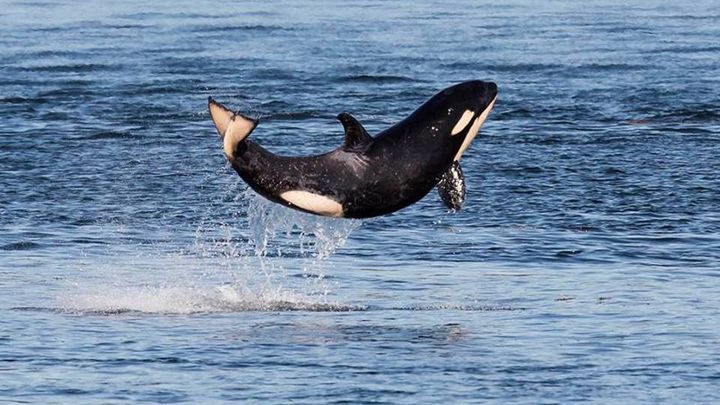
In Scarlet's Honor (The Orca)
But why do I care and why should you?
 Baby Scarlet once symbolized hope and revival of her family. She loved to breach and was once seen breaching 50 times in a row! (Photo credit: Clint Rivers)
Baby Scarlet once symbolized hope and revival of her family. She loved to breach and was once seen breaching 50 times in a row! (Photo credit: Clint Rivers)I have been privileged to travel in the San Juan Islands many times. The first time I was only 7. I remember riding the ferry boats with my eyes glued to the water just hoping for a glimpse of a fin. The J Pod orca whales frequent the summer waters of the San Juans. Imagine seeing Tahlequah, a 20 foot long orca, leaping out of the water before you, salt water cascading off her shiny black and white skin. Imagine smelling the sea water and hearing the crash as she flips on her back and reenters the cold water with a splash. Her family frolics behind her, their fins bobbing in and out of the foamy waves as they forage for salmon. The youngest whale, Kiki, slaps her tail on the water playfully and sings her family's song as she talks with her mother and aunts. Orcas are intelligent, sentient, sophisticated, highly social and compassionate. Orcas can live to be over 100 years old and never leave their family. They are majestic and a living symbol of the wild ocean, revered by the native peoples and tourists alike.
This summer I grieved with the rest of the world for Tahlequah and prayed for Scarlet. Did you hear their story?
If you didn't, please, here is a condensed version: there are three pods of resident orcas in the waters off the coast of Seattle. They are the population of Southern Resident Killer Whales. There are now a total of 74 orcas in the three pods, J, K,and L. These few whales are their own cultural community. They have their own language. No whales come nor go from these familial pods that are organized around a matriarch . They eat fish, primarily salmon, instead of seals. They stay in the waters in and around Puget Sound. And these whales are critically endangered. The population is the lowest it's been since 1976, with only 74 whales still living. And most troubling, there hasn’t been a live birth in the pods since 2015, until July 24th. J Pod's Tahlequah gave birth on that long anticipated day. Researchers and scientists were celebrating as they traveled to see the newly born whale, a new hope for the survival of these whales. But the day turned tragic when they arrived to see Tahlequah carrying a dead infant. The baby had only lived half an hour. The infant was emaciated and too weak to survive. And then the grief-stricken Tahlequah and her family carried the dead baby thousands of miles for 17 days as the world grieved with her. It makes you wonder if Tahlequah knows that we need to see and share her grief.
https://www.washingtonpost.com/news/animalia/wp/2018/08/10/the-stunning-devastating-weeks-long-journey-of-an-orca-and-her-dead-calf/
 Tahlequah carrying her dead baby this summer. (Photo Credit Outside Magazine, August 28, 2018)
Tahlequah carrying her dead baby this summer. (Photo Credit Outside Magazine, August 28, 2018)And now Scarlet has starved to death as well.
I am crying writing this. Tell me how this is alright. Tell me how this doesn’t move you. Tell me you will join me to fix it. But how? Keep reading.
Scarlet was critically ill and emaciated from lack of salmon in her feeding home. Scarlet was only 3 1/2 years old, but was tiny for her age. The Native American Lummi Nation desperately attempted to feed her their own live salmon stock and scientists scrambled to analyze fecal and breath samples from her and her family in the hope of supporting her survival through antibiotics and dewormers. She was a fighter her whole life. Scientists think she survived a whale-assisted breech midwifery birth that left rake marks and scars on her body, a testament to her fight, her family's commitment to her and the sophistication of these orcas. But none of these was enough to keep Scarlet alive.
 Rake marks from orca teeth on Scarlet's back. Scientists believe scarlet incurred these injuries during her difficult assisted birth. (NOAA Flickr page)
Rake marks from orca teeth on Scarlet's back. Scientists believe scarlet incurred these injuries during her difficult assisted birth. (NOAA Flickr page)Scarlet was hoped to be a breeding female someday. With the low birth rate and high mortality of infant whales, it is obviously important that every whale survive, but a female whale who could someday have offspring is doubly important. Now it is even more important that her aunts, sister and cousins get enough salmon to survive, grow and safely bear (or be midwives) those future baby whales.
74 whales, with only 27 females of reproductive age, is the lowest population since 1976. The Southern Resident Orcas are the second most endangered marine mammals on Earth. The reasons for their continued decline are numerous and complicated, but the widely acknowledged main cause is lack of food. The EPA estimates that there are currently only between 1% and 10% of the salmon in Puget Sound compared to historic levels. In order to save the orcas, we need to reestablish critically low Chinook salmon populations.
According to a study published in the journal PLOS last June:
"Low availability of Chinook salmon appears to be an important stressor among these fish-eating whales as well as a significant cause of late pregnancy failure, including unobserved perinatal loss.... Results point to the importance of promoting Chinook salmon recovery to enhance population growth of Southern Resident killer whales."
(https://journals.plos.org/plosone/article?id=10.1371/journal.pone.0179824)
This all seems so daunting. What can we do?
The situation is not set. There is still time to save these whales. We can make a difference. I am raising money to help the efforts to restore the Chinook salmon populations in the Northwest. The money will go to the non-profit Save Our Wild Salmon. Here is a little bit about what this organization does. Per their website, Save Our Wild Salmon "coordinates ... to inform and engage our constituencies, the public, key stakeholders and elected leaders regionally and nationally. We work closely with the State of Oregon, and with the Nez Perce and other Tribes in the Columbia Basin." (https://www.wildsalmon.org/about/about-us.html)
The stated dual purposes of Save Our Wild Salmon as stated on the coalition website:
"(1) Securing a durable, lawful, science-based federal plan - Federal Columbia River Power System (FCRPS) Biological Opinion - that protects and restores Columbia-Snake salmon and steelhead.... among other measures.
(2) Securing a modernized U.S. – Canada Columbia River Treaty that includes a new third purpose of ecosystem-based function or health of the river"
(https://www.wildsalmon.org/about/about-us.html)
I am supporting Save Our Wild Salmon because of their involvement with restoring salmon populations.
Will you help me support them?
These orca are worth saving! We need to start spilling right away and explore other options to increase salmon populations for Scarlet's surviving family to have any real chance of long-term survival. Any amount of money you give would be an immense help. If enough people give a little bit, we can force a change. I am aiming to raise $2,000 by October 10th to support the efforts of Save Our Wild Salmon. I want each person to give $5. The cost of a cup of coffee. It would make my day.
#InScarletsHonor #WeRememberJ50 #JPod #Only74Left #SouthernResidents
-Gaby Frey
__________________________________________________________________________________________________________________________________________________
Please respond to this survey. This is the public comment survey that goes directly to the Southern Resident Killer Whale Recovery Task Force. They would like to know what you think about the situation and if there are any options or ideas that you support.
https://www.surveymonkey.com/r/srkwtfpubliccomment
___________________________________________________________________________________________________________________________________________________
PS-Here are some more resources if you want to learn about Save Our Wild Salmon, Scarlet, the plight of J Pod and other ways to help:
An absolutely scathing must-read article about the problems the orca are facing and the paltry efforts being put forth to save them:
https://www.outsideonline.com/2339111/orcas-mist
Save Our Wild Salmon:
https://www.wildsalmon.org/about/about-us.html
Incredibly thorough and interesting page with links to DOZENS of articles about Orcas, spilling, removing the dams and many other topics: (https://www.wildsalmon.org/factsheets-and-reports/)
Scarlet:
https://www.npr.org/2015/01/03/374737042/orca-calf-shows-signs-of-orca-midwifery
http://www.wildorca.org/j50/
https://www.whaleresearch.com/
https://www.king5.com/article/news/local/young-orca-j50-presumed-dead-by-center-for-whale-research/281-593903579?ref=exit-recirc
Plight of J Pod and the Southern Resident Whales:
https://www.orcanetwork.org/Main/index.php?categories_file=Births%20and%20Deaths
https://www.whaleresearch.com/orca-population
https://www.smithsonianmag.com/smart-news/two-thirds-southern-resident-orca-pregnancies-fail-180963884
https://journals.plos.org/plosone/article?id=10.1371/journal.pone.0179824
http://leiren-young.com/orca-update-rip-sonic-stopkm/
https://www.king5.com/article/tech/science/environment/orca-calf-death-prompts-call-for-action/479179202
https://www.king5.com/article/news/local/young-orca-j50-presumed-dead-by-center-for-whale-research/281-593903579?ref=exit-recirc
https://www.cbc.ca/news/world/dead-killer-whale-possibly-linked-to-canadian-war-games-1.1160173
https://www.cbc.ca/news/canada/british-columbia/pregnant-killer-whale-j-32-was-starving-necropsy-reveals-1.2872002
https://www.theatlantic.com/national/archive/2014/05/spotted-really-cool-103-year-old-orca-and-her-family/370913/
http://www.chicagotribune.com/news/nationworld/ct-oldest-killer-whale-granny-j2-dead-105-20170104-story.html#
Orca Trapping for Amusement Parks and Lolita, last survivor of the captured Puget Sound whales
https://www.seaworldofhurt.com/orca-capture/
https://www.savelolita.org/
Taking Down The Dams:
https://www.columbian.com/news/2018/apr/04/study-sees-little-cost-in-removing-snake-river-dams/
https://nwenergy.org/featured/lsrdstudy/
Other Ways to Help:
https://whalemuseum.org/pages/seasound-remote-sensing-network
https://whalemuseum.org/products/make-a-donation
https://whalemuseum.org/collections/meet-the-whales
https://whalesanctuaryproject.org/our-work/
http://www.wildorca.org/j50/
https://www.whaleresearch.com/
- B
- J

